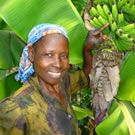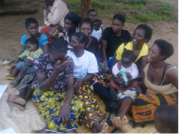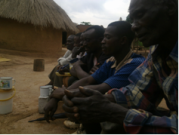1. Participatory assessment of cropping systems, soil health, and land and water use
2. Assessment of community vulnerabilities to climate change and to unsustainable agricultural and environmental practices
3. Community based restoration and management of depleted farmlands and ecosystems
4. Reducing shock from disasters through reforesting watersheds, riparian shores and mangrove forests
5. Combining local and scientific knowledge for improved agricultural practices that include water harvesting and improving soil health
6. Climate smart agricultural practices such as conservation agriculture and the use of drought resistant and early maturing crops
7. Engaging women and marginalized community members in agriculture and in other sustainable livelihoods
8. Building resilience by linking farmer associations to markets that routinely need agricultural products
9. Strengthening communities with family gardens: growing nutritious fruits and vegetables for food diversity and food security
10. Forming community management committees to steward these sustainable improvements for the long-term
What adaptation to climate change activities are available for use today? There is confusion over what adaptation activities are. Many people are expecting a palette of brand-new technologies to begin arriving any day now: adaptation silver bullets.
Fortunately, organizations like the FAO, CGIAR, IFPRI, ILEIA, ODI, IDS and 3ie have been researching, developing, and disseminating accessible, low-cost/no-cost technologies for use by smallholder farmers and the world’s poor—it’s simply a matter of organizations selecting the ones appropriate for their community partners.
How does one choose appropriate CBA activities?
- Step one is to engage community members in vulnerability, capacity and in environmental health assessments.
- Step two is to uncover local coping strategies and local knowledge—and to investigate sound, scientifically-based information that can enhance local knowledge.
- Step three is to partner with the community in project design and co-management.
The Center for Sustainable Development has compiled a number of resources for use by students developing field projects through its online field courses:
- 50 Programs for Use in Community Based Adaptation Projects
- 175 Student Projects Activities
- Community-Based Adaptation: 300 Hands-On Field Activities
Community based adaptation to climate change will kick-start a green economy by promoting sustainable use of ecosystem services through environmental restoration, by connecting smallholder farmers and small businesses to markets, and by building community resilience through disaster risk reduction, improvements in health and food security, and in the development of income generating, sustainable livelihoods. This new green economy will help the world’s poor lead the productive, meaningful, prosperous lives they need to leave the cycle of poverty and to continue to contribute to the sustainable development of their communities.
Tim Magee
Tim Magee is the author of the upcoming Earthscan book from Routledge: Field Guide To Community Based Adaptation.
Upcoming Online Field Courses. Learn about the courses where students develop projects in the field.



